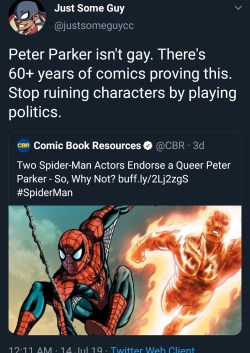People Are Seriously Opposed to a Queer Spider-Man. Why?
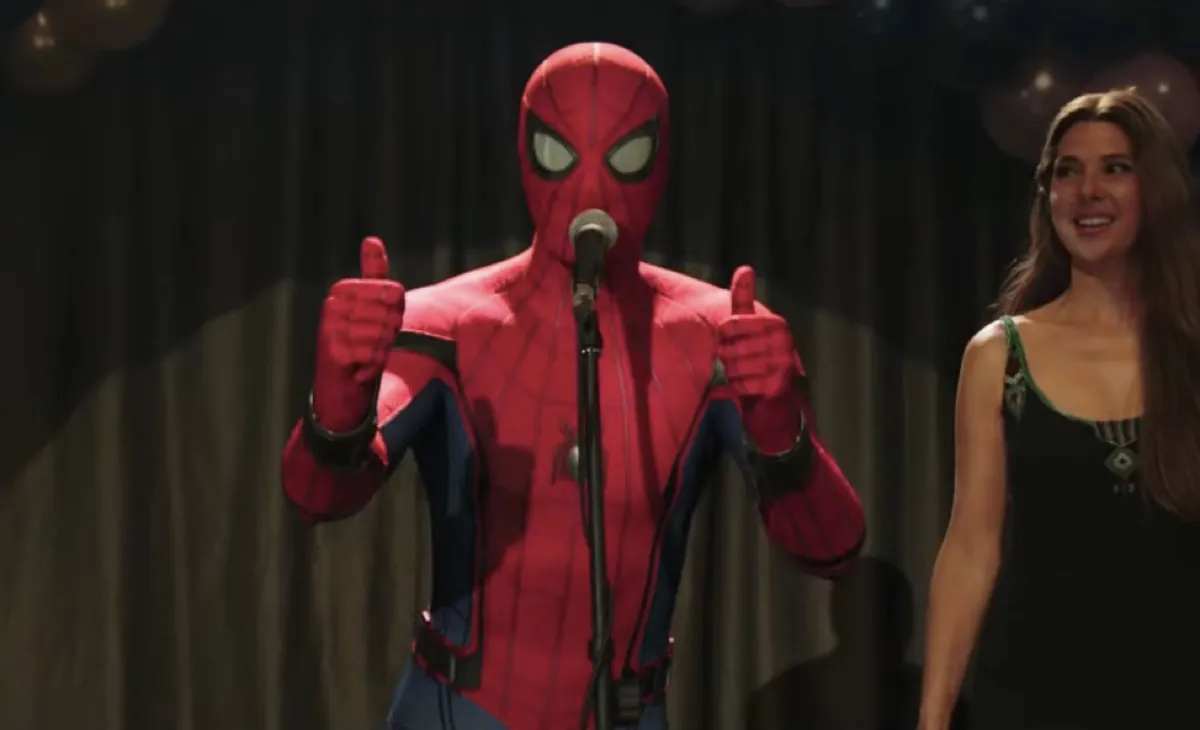
Tom Holland and Andrew Garfield, both famous for playing Spider-Man in movies, have one additional thing in common: They faced backlash after suggesting that Peter Parker might not be straight. Garfield teased the possibility of a bisexual Spider-Man back before The Amazing Spider-Man 2 hit theaters in 2014, while Holland very recently, when asked if Spider-Man could be gay, replied in the affirmative (almost enthusiastically).
This led to many fans and sites discussing the possibility of Peter Parker—or even any version of Spider-Man—being queer. For its part, Marvel hasn’t announced plans to give Peter a boyfriend in any form; talk has been restricted to discussion online.
Some have reacted with enthusiasm. Others reacted by angrily writing tweet essays.
For whatever reason, Peter Parker—or, indeed, any version of Spider-Man across the multiverse—being gay, bi, trans, ace, etc. has upset several members of the fan community. While it’s tempting to paint them all with the same brush, is it fair to call these people raging homophobes? Or, when someone asks, “What if Parker dated Johnny Storm, Harry Osborn, or Wade Wilson?” is there some other element at work that might be triggering this reaction? Let’s cover the angles.
Stan Lee
The late Stan Lee was one of Spider-Man’s co-creators, along with Steve Ditko. The two of them wrote Peter as a cisgender, heterosexual white male. Many fans have declared passionately that making Peter gay would counter that original vision.
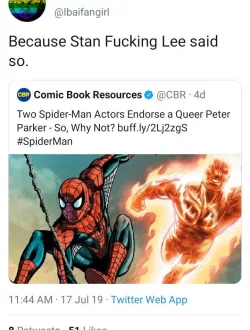 Ironically, many of the people don’t seem to care too much about other changes made to Peter’s character since then. Stan Lee didn’t seem too fond of the “Clone Saga,” where, for some time, the comics tried to convince readers that the Parker they knew was a clone of the original Spidey, and that newcomer Ben Reily was the original Peter. Lee wrote Peter as a guy perpetually down on his luck, so why were so many fans okay when Peter lived the high life while running Parker Industries?
Ironically, many of the people don’t seem to care too much about other changes made to Peter’s character since then. Stan Lee didn’t seem too fond of the “Clone Saga,” where, for some time, the comics tried to convince readers that the Parker they knew was a clone of the original Spidey, and that newcomer Ben Reily was the original Peter. Lee wrote Peter as a guy perpetually down on his luck, so why were so many fans okay when Peter lived the high life while running Parker Industries?
The argument that Peter shouldn’t be queer because Stan Lee didn’t envision it seems more like an excuse than anything else. Stan Lee wrote the first hundred or so issues of The Amazing Spider-Man. While he defined an era of Peter’s life, once he handed over writing duties to Gerry Conaway, that was it.
Lee was certainly allowed to share his opinions on what happened to his characters after that. He was allowed to express that he wrote Peter as a cis-het character. But at the end of the day … so what?
People use Lee’s words to further their ends; they aren’t motivated by them.
Changing What They Loved
Backlash is inevitable to any change, especially among fans. Fans fall in love with a character. Any changes made to that character will result in fans getting angry. It’s one of the reasons why Spider-Man fans still aren’t over One More Day retconning Peter and Mary Jane’s marriage out of continuity.
One thing many people pointed out when confronted with the possibility of a queer Spider-Man is that Peter Parker fell in love with women. He loved Gwen Stacy. He loves Mary Jane. He lusted for Felicia Hardy. These are stories that resonate with readers. If Peter is gay, wouldn’t that take meaning away from those stories?
People who feel this way either deliberately or accidentally erase the possibility that Parker is bisexual or asexual. Part of this could be because this topic was reignited by Tom Holland saying that, yes, Spider-Man could be gay—”gay” specifically. So, it makes sense, in some way, for these people to feel like that doesn’t match up to those past details.
But for others, no matter the specific word choice, when they hear “queer” or “LGBTQA,” they only hear “gay,” because, to them, sexuality is static and binary. You’re straight or you’re gay. That’s how they see it, and Peter must fit neatly into one of those categories.
And that’s highly problematic.
Still, of all the reasons, if they don’t want to retcon stories that mattered to them, that’s fine. That makes sense, but it also has no bearing on whether there can be a queer Spider-Man. Just put a queer Spidey in the Spider-Verse. The movie versions of Spider-Man are already not in the same continuity as the comics, so continuity isn’t really a problem.
Donald Glover and Miles Morales
Comments arguing that Spidey can’t be queer because he’s always been straight inevitably remind readers of debates held back when Sony was casting a new Spider-Man for 2012’s Amazing Spider-Man. A huge fan campaign fought for Donald Glover to be cast as Peter Parker. Backlash was immediate. For those fans, Glover, a black actor, couldn’t play Spider-Man, because Peter is white. He’s always been white. He can’t be black.
This ignored the fact that, by this point, there was already an Indian Spider-Man, a Japanese Spider-Man, the latino Spider-Man 2099, and so on. However, the desire for a black Spider-Man helped inspire Brian Michael Bendis to create Miles Morales.
While Miles is now a beloved hero in his own right, thanks in part to appearances in Spider-Man: Into the Spider-Verse and the PlayStation 4 game Spider-Man, Miles met with a lot of controversy upon his first appearance. Many people were angry that Peter Parker was being replaced by this “SJW-PC” character.
Even though Miles wasn’t Peter Parker and didn’t replace Marvel comics’ main “616” universe Peter Parker, people still reacted the same way they would’ve had Parker actually been retconned as a person of color, even though Miles has gone on to cement himself as a fascinating character in his own right in the pages of Ultimate Spider-Man.
Spider-Verse
Miles’s theatrical debut, Spider-Man: Into the Spider-Verse, ends with the thesis that anyone can be Spider-Man. Peter B. Parker has a Jewish wedding. Peni Parker is a small Japanese girl. Spider-Ham is an actual pig.
So, okay. There are legitimate reasons a person might be upset if Peter were retroactively turned into a gay man (specifically, though, as gay). They don’t want the old love stories between Mary Jane or Gwen to go away. So, naturally, including a queer Spidey in the multiverse might be a good compromise.
Yet, just like how people were upset by a black Spider-Man, regardless of whether it was Peter Parker or Miles Morales, people are upset by the very idea of any Spider-Man being queer—at all.
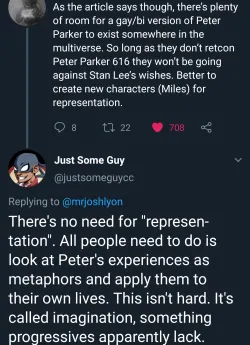 What follows are two distinct camps: people who are “okay” with Spidey being queer, so long as they never have to see it, and people who are against the concept in any shape or form. While we’ve gone over their arguments so far without resorting to the simpler explanation of “they’re just homophobic,” it’s impossible to lie to you anymore.
What follows are two distinct camps: people who are “okay” with Spidey being queer, so long as they never have to see it, and people who are against the concept in any shape or form. While we’ve gone over their arguments so far without resorting to the simpler explanation of “they’re just homophobic,” it’s impossible to lie to you anymore.
They’re homophobic
There are several groups in the comic book fandom who are angry that their fandoms are changing. What they once perceived as a hobby for cishet white boys, they have realized, is actually a diverse culture filled with all sorts of people, and all of them want to feel represented in the medium. Women, people of color, the LGBTQA community—we all want superheroes to represent our life experiences in some way.
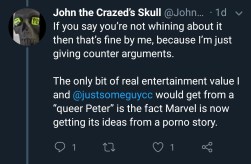 But while minorities have always had to identify with characters unlike ourselves, the cishet white males who believe themselves to represent the entire fandom have not, despite how they say that other should learn to do it. While many welcome new characters that can appeal to minorities, there is a large faction that does not. They’re like children who have never had to share their toys being asked to lend one of their own to the new kid. They just can’t deal with it.
But while minorities have always had to identify with characters unlike ourselves, the cishet white males who believe themselves to represent the entire fandom have not, despite how they say that other should learn to do it. While many welcome new characters that can appeal to minorities, there is a large faction that does not. They’re like children who have never had to share their toys being asked to lend one of their own to the new kid. They just can’t deal with it.
This has led to cringe-inducing social movements such as ComicsGate, where fans and even creators gang up and harass writers and artists who dare to bring their own life experience and perspectives to the medium of comics. The group centers around toxic concepts about masculinity, where they see homosexuality (the only part of the LGBTQA culture they acknowledge exists) as inherently emasculating.
So, to them, the concept of Spider-Man—a character they might have identified in some small way—being gay is the same as being emasculated themselves, which is such a bizarre, twisted, fragile way of thinking that it’s hard for a person outside their group to wrap their mind around it.
Make the original Peter gay? Make the Spider-Man of Earth-6969 gay? It doesn’t really matter. They will treat it as the same thing.
They will never accept any diverse changes. They react with the same uniform anger to anything that means they have to share their fandom with someone else.
Anthony Gramuglia has written for CBR, ScreenRant, Anime Feminist, and Vocal. He is an MFA Graduate with an enthusiastic love for writing and all sorts of fandom stuff. You can follow him on Twitter at Check out @AGramuglia.
(featured image: Marvel Entertainment)
Want more stories like this? Become a subscriber and support the site!
—The Mary Sue has a strict comment policy that forbids, but is not limited to, personal insults toward anyone, hate speech, and trolling.—
Have a tip we should know? [email protected]

